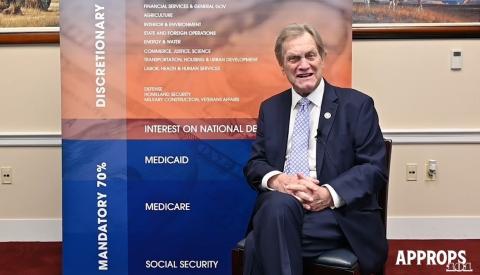Interior Motives: Strong Stewardship of America’s Resources
All good things must come to an end. As we reflect on our 12 subcommittees, this year’s Appropriations 101 program concludes with our final bill - detailed by Congressman Mike Simpson (R-ID) himself! As Chairman of the Interior and Environment Subcommittee, he unveils the essential resources and all-of-the-above energy approach the legislation prioritizes.
Simpson highlights the strong investments that uphold our nation’s trust and treaty responsibilities to our tribal communities and secure a permanent pay fix for our brave federal wildland firefighters who are focused on protecting our public lands and communities. In a limited resource environment, funds are targeted where they are most needed.

Watch Subcommittee Chairman Simpson’s episode here.
Simpson: “I will tell you the biggest challenge we face. In a decreasing budget, the Interior and Environment Appropriations Bill counts for about 2.3% of all discretionary spending. That's about 0.5% of the overall federal budget – one-half of one percent.”
“Even in a decreasing budget, we have areas in our budget that have to be increased - Indian Health Services, we also do the Bureau of Indian Affairs, Indian Law Enforcement and Justice Services, Indian education. We have a trust and moral responsibility to our Native American brothers and sisters. Taking care of their health issues is a big thing. Even in a decreasing budget like last year, our Subcommittee’s budget went up $1.8 billion for Indian Health Services. We have to do the same thing for Indian Justice and Law Enforcement. We lose about 6,000 Indigenous women and children that are murdered and missing on our reservations across America. That is unacceptable. So, we have to increase funding for those programs.”
“The other thing we have to pay for is our wildfire firefighters. We have to pay them a salary that can attract and keep them fighting these wildfires in the western United States and all over the country. That was an increase in funding. The other increase in funding is the PILT payments. States that are public land states have Payment in Lieu of Taxes, and that's important to states like Idaho, as I said, [where] you can only tax 1/3 of the land. That keeps going up every year. So, those are the things that we have to increase, even in our reduced overall budget. That means there are other agencies that are going to be significantly reduced, more than some people would like. That's what this appropriations process is all about. It's about making choices and setting priorities, and that's what we have to do. We will continue to do that and still maintain our public lands, our national monuments, our national parks, and other things that are very important to the American people.”
…
Simpson: “In future episodes, we'll be talking with organizations like the Committee for a Responsible Federal Budget that has ideas of things that we can do to reduce the debt and deficit. Ultimately, what the Appropriations Committee is concerned about is not only getting our job done on time but also heading our budget in the right direction so that we can get rid of this debt and deficit that we are heaping on our children.”
###
